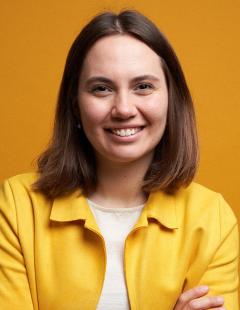Sabrina Küspert
Tell us about your background
I came to Oxford from an exciting role as Strategy Consultant with the Boston Consulting Group in Berlin. There I had helped establish the global Responsible AI practice and advised both public and private sector organisations worldwide on emerging technologies. With an academic background in Business and Economics and first-hand experience in strategy consulting, economic research and social entrepreneurship, I was always passionate about global equal development. To allow myself to think more deeply about the complex dependencies, I wanted to spend a year on policy-relevant research at the intersection of Economics for Development and Artificial Intelligence.

“[ODID] is committed to producing not only scholars, but also individuals who can make an immediate, positive impact on international efforts, solving real-world problems.”
“[ODID] is committed to producing not only scholars, but also individuals who can make an immediate, positive impact on international efforts, solving real-world problems.”
What made you choose to study at ODID?
Disruptive technological change calls for guidance on how our society can navigate the transition to a world with emerging technologies like AI, rooted in global equal development. Graduate studies in Economics for Development at the Oxford Department of International Development (ODID) and the Department of Economics are embedded in one of the world’s strongest networks on the effects of AI on our society, including the Oxford Internet Institute, the Blavatnik School and the Oxford Martin School. I chose this course because, next to the academic challenge, I wanted to be part of this thriving community.
What do you particularly like about ODID?
What I admire about ODID is its unparalleled commitment to academic rigor combined with practical applicability. The department is intrinsically linked with a broad spectrum of leading institutions and experts, both within and beyond the Oxford community. It is committed to producing not only scholars, but also individuals who can make an immediate, positive impact on international efforts, solving real-world problems.
What do you particularly like about your course of study?
I am grateful for that the faculty has welcomed my focus on the intersection of AI and Economics for Development. The flexibility of the program allowed me to tailor my studies to this emerging field. For my dissertation on "How to govern Artificial Intelligence? The trade-offs between welfare, prosperity and inquality" I received excellent supervision despite the novelty of the topic. The course provided the foundation to better understand the global effects of technological change and to undertake economic research for effective policy design. The strong support system gave me the freedom to become Fellow and Expert on AI at the German Tech Think Tank Stiftung Neue Verantwortung in parallel to my stay at the University of Oxford, and independently advise decision-makers in Brussels on the EU AI Act, the first-ever regulatory framework on AI.
What did you research for your dissertation?
While AI is increasingly recognised for its potential to boost economic growth, it can also lead to direct social harms and can exacerbate inequality between advanced and developing countries. My dissertation explores the trade-offs between welfare, prosperity, and inequality that flow from growing investments in increasingly capable AI. Building on Alonso et al. (2022), I consider AI as a distinct type of capital which increasingly substitutes for human labour. I extend the model by treating AI as generating negative externalities, and I analyse the impact of a coordinated tax policy set to optimise societal welfare for the world, on advanced and developing economies. My findings reveal that while such a policy can lead to a substantial welfare gain for advanced economies, by addressing AI’s negative externalities, it may have unintended consequences, resulting in a net negative welfare effect for developing countries. The policy contributes positively to reducing the GDP growth gap between advanced and developing economies. The more closely substitutable AI capital would be for labour, the more substantially the advanced economy would benefit from the policy, relative to the developing economy. This analysis can be seen as a stepping stone toward a more comprehensive understanding of these complex relationships.
Is life at Oxford different from how you expected it to be?
Life at Oxford proved far different than I envisioned – in unexpectedly wonderful ways! I had this image in my head of long hours at the Bodleian Libraries, formal halls where students and faculty gather in formal gowns for dinner, spending time at beautiful college gardens… Instead, I was seeking a less traditional Oxford experience. I joined Reuben College, Oxford's newest college focused on AI and real-world impact. I enjoyed lunches with some inspiring researchers on AI, Economics and Policy. And Oxford served as my home base to travel as independent researcher to conferences, workshops and meetings on AI Goverance and Policy, including London, Brussels, Berlin and the US Bay Area.
What advice would you give to someone thinking of applying?
First, consider connecting with alumni or current students who have pursued the course you're interested in. Individuals with a background similar to yours – whether it's a shared previous university, workplace, or hometown – are usually quite receptive to sharing their experiences. Such insights can provide invaluable help in making an informed decision and preparing your application. Second, remember that you have the agency to shape your experience at this university. Certainly, there are inherent responsibilities that come with studying here. However, by submitting your application, you're initiating a potentially unique journey where you can set your own goals, actively engage with faculty on your priorities, and leverage a strong support system to make it the best possible fit for yourself.
